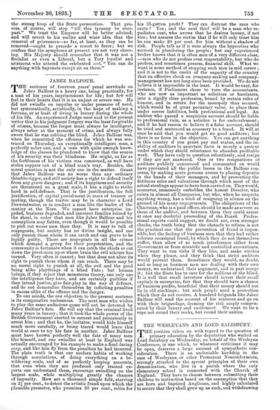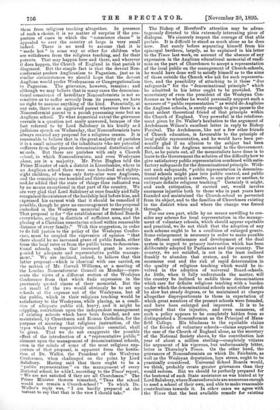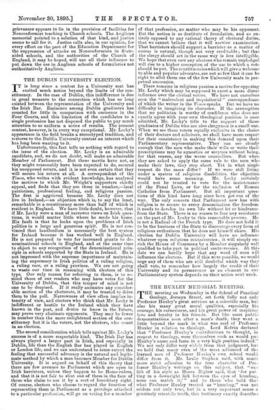THE WESLEYANS AND LORD SALISBURY. T HE position taken up with
regard to the question of primary education by the deputation who waited on Lord Salisbury on Wednesday, on behalf of the Wesleyan Conference, is one which, to whatever criticisms it may be open, deserves a large amount of sympathetic con- sideration. There is an undeniable hardship in the ease of Wesleyans, or other Protestant Nonconformists, strongly attached to the special principles of their own denomination, who live in a parish where the only elementary school is connected with the Church of England. They have to choose between submitting their children to instruction based on the assumption that they are born and baptised Anglicans, and highly calculated to secure that they shall grow up as such, and withdrawing them from religious teaching altogether. In presence of such a choice, it is no matter of surprise if the pro- portion of cases in which the "conscience clause" is appealed to over the country at large is very small indeed. There is no need to assume that it is "made hot" in some way or other for children who are withdrawn from the religious teaching, and for their parents. That may happen here and there, and wherever it does happen, the Church of England in that parish is disgraced. But the simple fact is that the devout Non- conformist prefers Anglicanism to Paganism, just as in similar circumstances we should hope that the devout Anglican would prefer Wesleyanism or Congregationalism to Paganism. The grievance, however, remains ; and although we may believe that in many cases the denomina- tional conscience of hereditary Nonconformists is not so sensitive as to suffer severely from its pressure, we have no right to assume anything of the kind. Potentially, at any rate, there is an aggrieved parent wherever there is a Nonconformist parent in a parish possessing none but an Anglican school. To what numerical extent the grievance prevails is a question not easily answered, because of the fact referred to by Lord Salisbury in his kindly at:d judicious speech on Wednesday, that Nonconformists have always resisted any proposal for a religious census. It is reasonable to believe that in the great majority of parishes it is a small minority of the inhabitants who are potential sufferers from the present denominational distribution of sc'tools. But there are parishes with only a Church school, in which Nonconformists, and even Wesleyans alone, are in a majority. Mr. Price Hughes told the Prime Minister of such a district in Lincolnshire, where in an Anglican school there were one hundred and eighty- eight children, of whom only forty-nine were Anglicans, and the remaining one hundred and thirty-nine Wesleyans, and,,he added that the state of things thus indicated was by no means exceptional in that part of the country. We are very glad that Lord Salisbury at once frankly and fully recognised the existence of the hardship laid before him, and expressed his earnest wish that it should be remedied if possible, though he gave no encouragement to the proposal embodied in the Wesleyan memorial for remedying it. That proposal is for "the establishment of School Boards everywhere, acting in districts of sufficient area, and the placing of a Christian unsectarian school within reasonable distance of every family." With this suggestion, in order to do full justice to the policy of the Wesleyan Confer- ence, must be coupled the expression of opinion "that there should be no increased grant of public funds, either from the local rates or from the public taxes, to denomina- tional schools, unless that increased grant is accom- panied by adequate and representative public manage- ment." We are inclined, indeed, to believe that this latter proposal—which is identical with one carried, on the motion of Mr. Carvell Williams, at a meeting of the London Nonconformist Council on Monday—repre- sents the views of a different section of the Wesleyan Conference from that which finds expression in the previously quoted clause of their memorial. But the net result of the two would obviously be to set up sehools at the expense not of the Wesleyans, but of the public, which in their religious teaching would be satisfactory to the Wesleyans, while placing, as a condi- tiou of adequate public aid, heavy, and it might be crippling, restrictions upon the independent management of existing schools which have been founded, and are maintained, by Churchmen and Roman Catholics, for the purpose of securing that religious instruction, of the types which they respectively consider essential, shall be given. That we do not exaggerate the possible effect of the introduction of a "representative public" element upon the management of denominational schools, even in the minds of some of the most religious sup- porters of that proposal, is apparent from the hesita- tion of Dr. 'Waller, the President of the Wesleyan Conference, when challenged on the point by Lord Salisbury. Having said that there ought to be a " public representation" on the management of every National school, he addel, according to the Times' report, "We are not satisfied if they are all Churchmen." The Prime Minister thereon remarked, "Thus the school would not remain a Church-school?" To which Dr. Waller's reply was, "I am hardly prepared at the instant to say that that is the view I should take." The Bishop of Hereford's attention may be advan- tageously directed to this extremely interesting piece of dialogue. We sincerely respect the courage of that able prelate. It is difficult to stand as much alone as he does now. But surely before separating himself from his episcopal brethren, largely, as he explained in his letter to the Times last week, on account of the absence of any expression in the Anglican educational memorial of readi- ness on the part of Churchmen to accept a representation of the local public on the management of Church-schools, he would have done well to satisfy himself as to the aims of those outside the Church who ask for such representa- tion, and the possibility of attaching to it those "due safeguards" for the "denominational principle" which he admitted in his letter ought to be provided. The uncertainty of even the president of the Wesleyan Con- ference as to whether he would personally support such a measure of "public representation" as would de-Anglicise the Anglican schools, is surely enough to give pause to the most ardent theoretical friend of that principle within the Church of England. Very powerful is the reinforce- ment given by Dr. Waller's hesitation to the argument of Archdeacon Wilson's excellent letter in reply to Bishop Percival. The Archdeacon, like not a few other friends of Church education, is favourable to the principle of local public representation, and he would have been per- sonally glad if an allusion to the subject had been embodied in the Anglican memorial to the Government. But, as he points out, all the memorialists have done is to leave to the Government the solution of the difficulty how to give satisfactory public representation combined with satis- factory safeguards for the denominational principle. With- out such safeguards, "public representation in denomina- tional schools might pass into public control, and public control might permit a resolve, in one place or another, to extirpate definite religious teaching." Certainly it might, and such extirpation, if carried out, would involve enormous injustice both to those who in past years have founded and maintained the Church-school so perverted from its object, and to the families of Churchmen existing in the district when and where the change was forced through.
For our own part, while by no means unwilling to con- sider any scheme for local representation in the manage- ment of voluntary schools, which should appear equitable and practical, we do not think that the adoption of any such scheme ought to be a condition of enlarged grants. Some enlargement is necessary in order to make possible the efficient continuance and development of the dual system in regard to primary instruction which has been deliberately adopted by Parliament and the country. The country, we are satisfied, is not in the least inclined frankly to abandon that system, and to accept the enormous cost and the risk of rapid deterioration in the quality of religious teaching which would be in- volved in the adoption of universal Board-schools. As little, when it fully understands the matter, will the country be inclined to saddle those denominations which care for definite religious teaching with a burden under which the denominational schools must either perish by slow but steady degrees, or be maintained at charges altogether disproportionate to those in expectation of which great numbers of the present schools were founded, and have been enlarged and improved. It is to be regretted that the injustice, and even meanness, of such a policy appears to be completely hidden from so distinguished a Nonconformist as the Principal of Mans- field College. His blindness to the equitable claims of the friends of voluntary schools—claims supported in the case of the Church of England alone, as the secretary of the National Society shows, by the contribution last year of about a million sterling—completely vitiates the argument of his vigorous, but unfortunately bitter, letter in Thursday's Times. On the other hand, the grievances of Nonconformists on which Dr. Fairbairn, as well as the Wesleyan deputation, lays stress, ought to be practically considered. Universal School Boards would, we think, probably create greater grievances than they would redress. But we should be perfectly prepared for the bestowal of such State assistance as was hinted at by Lord Salisbury,where Nonconformists are numerous enough to need a school of their own, and able to make reasonable contributions towards it. In other cases we agree with the Times that the best available remedy for existinz grievances appears to lie in the provision of facilities for Nonconformist teaching in Church schools. The Anglican memorial pointed to a solution of that kind, and justice seems to call for it. Justice calls also, in our opinion, for every effort on the part of the Education Department for the suppression of attacks on Nonconformists in State- aided schools, and the authorities of the Church of England, it may be hoped, will use all their influence to put down the use in Anglican schools of formularies not authoritatively Anglican.












































 Previous page
Previous page